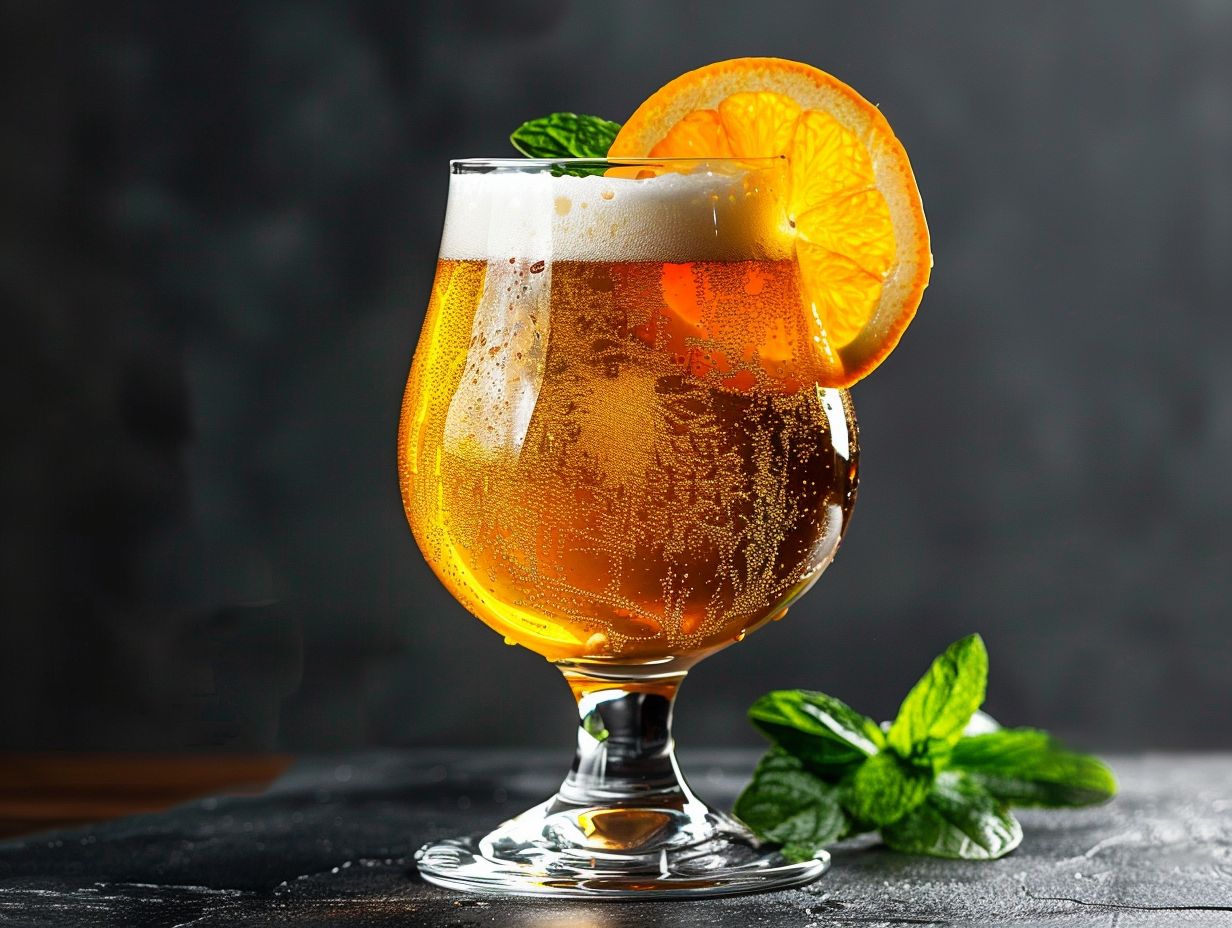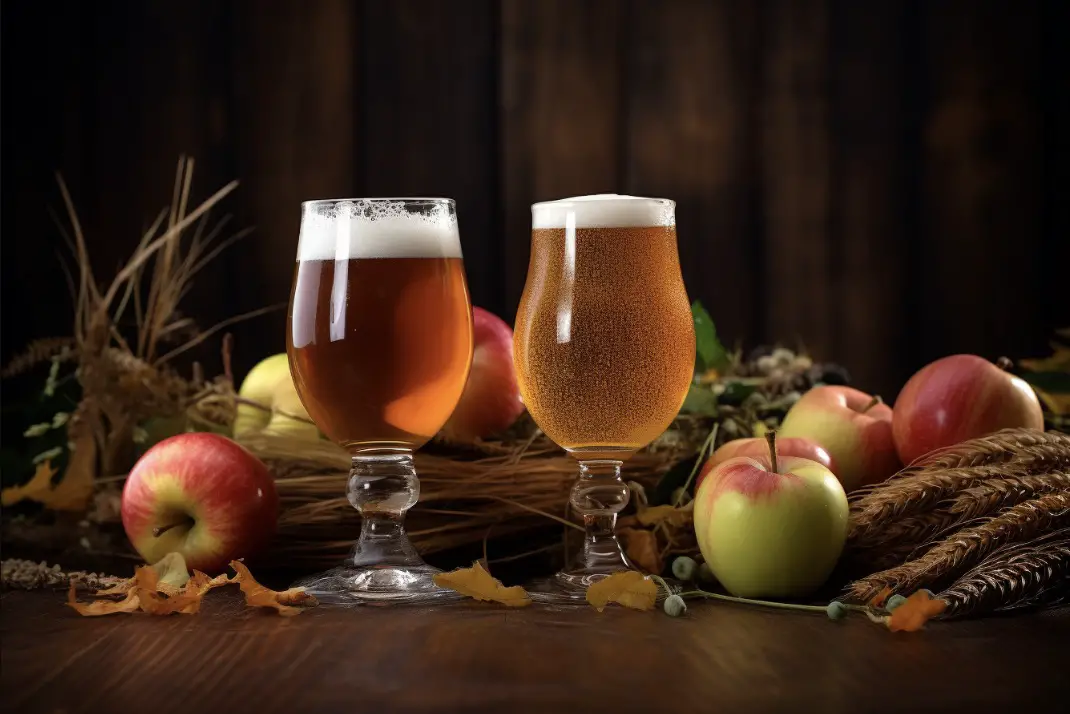Have you ever heard of sweet beer? It’s a unique and flavorful twist on traditional brews that is gaining popularity among beer enthusiasts.
Explore the different types of sweet beer, such as fruit-flavored, Belgian-style, and milk stout.
Discover what sets sweet beer apart from other varieties, including its higher residual sugar content, use of non-traditional ingredients, and lower bitterness levels.
Delve into the delicious flavors and aromas of sweet beer, such as fruity, chocolatey, and caramel notes.
Learn about the potential health benefits of enjoying a cold, sweet beer. So grab a cold one and dive into the world of sweet beer!
How Does Sweet Beer Taste?
Sweet beer is a unique and flavorful beverage crafted through a specialized brewing process that incorporates ingredients like malt, hops, yeast, and sometimes additional sweeteners to create a delightful taste profile for connoisseurs and beer enthusiasts.
The distinctive flavor profile of sweet beer is characterized by its balance of sweetness and bitterness, providing a complexity that appeals to those with a refined palate. Brewers often utilize techniques such as late malt additions or specialized yeast strains to enhance the beer’s sweetness.
The aroma of sweet beer is inviting, with notes of caramel, fruits, or even hints of chocolate depending on the brewing recipe. This results in a sensory experience that captivates craft beer lovers and offers a unique twist on traditional beer styles.
What are the Different Types of Sweet Beer?
Sweet beer comes in various types, including fruit-flavored varieties that offer a fruity twist, Belgian-style options that exude rich caramel notes, and milk stout variations known for their dessert-like qualities.
Each category brings a unique experience for beer enthusiasts. Fruit-flavored sweet beers are often brewed with real fruits or fruit extracts, creating a refreshing and vibrant taste profile. Belgian-style sweet beers showcase complex flavors with hints of spice, toffee, and dark fruits, capturing the essence of Belgian brewing traditions. On the other hand, milk stouts are distinct for their creamy texture and sweet flavors reminiscent of chocolate, coffee, and sometimes even vanilla. The brewing techniques and ingredients used in each type play a crucial role in defining their overall taste and aroma.
1. Fruit-flavored Sweet Beer
Fruit-flavored sweet beer offers a delightful combination of sweet and fruity notes, achieved through the infusion of natural fruit flavors and sometimes sugar adjuncts to create a confectionery-inspired beverage.
These beers often boast a vibrant array of fruit profiles, ranging from zesty citrus to succulent berries, offering a refreshing and indulgent experience to the drinker’s palate. The infusion techniques employed vary, with some brewers opting for pureed fruit additions during the fermentation process, while others rely on fruit extracts for a more concentrated flavor impact. The natural sugars present in the fruits not only add sweetness but also enhance the overall complexity, making each sip a symphony of fruity nuances combined with a hint of confectionery charm.
2. Belgian-style Sweet Beer
Belgian-style sweet beer is crafted using traditional brewing techniques that focus on specific yeast strains, malt selections, and fermentation processes to achieve a balanced flavor profile with a hint of sweetness.
Fermentation plays a crucial role in developing the unique characteristics of Belgian-style sweet beer. The use of top-fermenting yeast strains at higher temperatures contributes to fruity and spicy esters, adding complexity to the beer’s flavor. The careful selection of malt varieties like Pilsner, Munich, and caramel malts imparts a rich, malty sweetness to the brew. By balancing these elements through precise brewing methods, brewers can create a harmonious blend of flavors that make Belgian-style sweet beer a favorite among beer enthusiasts.
3. Milk Stout Sweet Beer
Milk stout sweet beer stands out for its rich caramel notes and velvety texture, achieved through a meticulous brewing process that often includes the use of sugar adjuncts to enhance sweetness and aroma.
These caramel undertones are a result of the special malts used during brewing, such as caramel or crystal malts, which impart a distinct sweetness to the beer.
The brewing techniques involved in creating milk stout sweet beer focus on achieving a smooth and creamy mouthfeel, giving it a luxurious quality. The infusion of sugar adjuncts like lactose further contributes to the beer’s sweetness, balancing out the roasted malt flavors.
This combination results in a delightful complexity of aromas, with hints of toffee, chocolate, and coffee nuances that make each sip a truly indulgent experience.
What Makes Sweet Beer Different from Other Beers?
Sweet beer stands out from other beer varieties due to its higher residual sugar content, which contributes to a unique flavor profile that caters to consumer preferences for a well-balanced and enjoyable drinking experience.
This elevated sugar content in sweet beers not only satisfies those with a penchant for sweeter flavors but also attracts a diverse audience seeking a departure from the traditional bitterness found in many beer styles. The demand for sweet beers has been steadily increasing as consumers look for more options that offer a harmonious blend of sweetness and subtle complexities. Unlike their counterparts, sweet beers often feature fruity undertones and a smoother finish, making them an appealing choice for those exploring the rich diversity of beer offerings.
1. Higher Residual Sugar Content

One key aspect that differentiates sweet beer is its higher residual sugar content, resulting in pronounced sweetness and sugary notes that cater to the evolving consumer demand for beverages with distinct flavor profiles.
The increased residual sugar in sweet beers not only adds a delightful sweetness but also enhances the complexity of flavors, providing a unique experience for beer enthusiasts. The sugary notes in these brews can range from caramel and toffee to fruity undertones, creating a diverse palate of tastes. Consumer perception of sweetness in beer varies widely, with some favoring bolder, sweeter options while others opting for a more subtle sweetness. This diversity in preferences has led brewers to experiment with different levels of residual sugar to cater to a broad spectrum of tastes in the market.
2. Use of Non-traditional Ingredients
Sweet beer sets itself apart by incorporating non-traditional ingredients that spark creativity and innovation within the brewing industry, paving the way for unconventional flavor profiles and experimental brewing techniques.
As breweries seek to push boundaries and captivate the taste buds of consumers, the use of unique additions like fruits, spices, herbs, and even unconventional grains has become a hallmark of the craft beer scene. These non-traditional ingredients open up a world of possibilities for brewers, allowing them to craft beverages that challenge traditional norms and appeal to adventurous palates. By embracing ingredient diversity and experimenting with bold combinations, breweries infuse their creations with a sense of excitement and originality that resonates with a growing segment of beer enthusiasts.
3. Lower Bitterness Levels
Sweet beer distinguishes itself from other brews by offering lower bitterness levels, focusing instead on achieving a harmonious balance of flavors that cater to the discerning palate of craft beer enthusiasts and specialty brew connoisseurs.
This deliberate reduction in bitterness levels not only allows for a smoother and more approachable drinking experience but also showcases the meticulous craftsmanship of modern craft breweries. By prioritizing flavor complexity and subtle nuances over aggressive bitterness, sweet beer opens up a whole new world of taste sensations for those seeking a tailored and sophisticated palate adventure. It represents a shift towards more nuanced and refined brewing techniques, where brewers experiment with innovative ingredients and fermentation processes to create unique and exciting flavor profiles.”
What are the Flavors and Aromas of Sweet Beer?
Sweet beer delights the senses with a range of flavors and aromas, from fruity notes that evoke freshness to chocolatey undertones and caramel sweetness that offer a decadent experience to the palate.
These delightful attributes come together to create a symphony of taste sensations that cater to a diverse array of preferences. The infusion techniques used in crafting sweet beer play a crucial role in bringing out these nuanced flavors, balancing the fruity freshness with the chocolatey richness and the lingering caramel sweetness. Each sip offers a journey of complex aromas that dance on the senses, making sweet beer a truly unique and captivating beverage for enthusiasts of all palates.
1. Fruity
Fruity sweet beer captivates drinkers with its vibrant fruit flavors, accentuated by subtle sugary notes that result from precise fermentation processes, delivering an enticing aroma that enhances the overall drinking experience.
The infusion of natural fruits during the brewing process plays a pivotal role in shaping the flavor profile of sweet beers. Through innovative fermentation techniques, brewers masterfully extract the essence of fruits to create a harmonious blend of sweetness and tanginess. The fruity notes meld seamlessly with the malt backbone, creating a symphony of flavors that dance on the taste buds.
The aroma of fruit-infused sweet beer is like an olfactory journey, evoking images of sun-kissed orchards and ripe harvests, enticing the senses before even taking the first sip.
2. Chocolatey
Chocolatey sweet beer offers a decadent and dessert-like experience, with rich cocoa undertones and sugary accents that cater to the discerning palate of craft beer enthusiasts seeking a unique and indulgent drinking option.
This luscious beer combines the best of both worlds, blending the bitterness of dark chocolate with the smoothness of sweet malt to create a symphony of flavors on the taste buds.
The velvety texture and luxurious mouthfeel of this brew evoke images of indulgent dessert spreads, making it a perfect after-dinner treat or standalone delicacy.
Crafted with precision and passion, chocolatey sweet beer is a delectable concoction that brings joy and satisfaction to those who appreciate the finer things in life.
3. Caramel

Caramel-infused sweet beer entices consumers with its luscious caramel notes, achieved through the meticulous use of sweeteners and the artistry of craft breweries that specialize in creating distinctive and aromatic brews.
The allure of this specialty beverage lies in the harmonious blend of caramel infusion and carefully selected sweeteners, enhancing the complexity of flavors and aromas. Craft brewery craftsmanship plays a pivotal role in perfecting the brewing process, ensuring that each batch of caramel-flavored beer is a delightful sensory experience. The rich, smooth texture of caramel intertwines with the hoppy bitterness, creating a unique balance that captivates the taste buds of beer enthusiasts seeking something beyond the ordinary.
This tantalizing beer variant offers a sophisticated and indulgent option for those with a penchant for refined flavors.
What are the Health Benefits of Sweet Beer?
Sweet beer offers more than just delightful flavors; it also provides health benefits such as antioxidants that combat free radicals, essential nutrients that support overall well-being, and digestive properties that aid in digestion processes.
The antioxidant content in sweet beer plays a crucial role in neutralizing harmful free radicals in the body, helping to reduce the risk of chronic diseases and promoting cellular health. The nutrient profile of sweet beer includes vitamins, minerals, and amino acids that contribute to a balanced diet and support various bodily functions. The digestive benefits of sweet beer can help improve gut health by facilitating smooth digestion and better nutrient absorption, ultimately contributing to a holistic drinking experience.
1. Source of Antioxidants
Sweet beer serves as a source of antioxidants, offering health benefits through its ingredients, including sugar adjuncts that contribute to the antioxidant properties sought after by health-conscious consumers.
The presence of antioxidants in sweet beer is particularly appealing to individuals who are looking to incorporate more functional ingredients into their diet. The antioxidant-rich nature of sweet beer not only aligns with the rising consumer demand for products that offer health benefits, but it also caters to the trend of choosing beverages that not only quench thirst but also provide nutritional value. With sugar adjuncts added to enhance the antioxidant content, sweet beer encapsulates a blend of taste and wellness, making it a popular choice among those seeking a delicious yet nutritious option.
2. Contains Nutrients
Sweet beer contains a range of nutrients derived from its brewing process and ingredients, offering a nuanced flavor profile that combines essential nutrients with subtle sugary notes for a wholesome drinking experience.
The ingredients used in sweet beer, such as barley and hops, contribute to its nutrient richness. Barley, a key ingredient, provides fiber, vitamins, and minerals, while hops offer antioxidants and anti-inflammatory properties. The brewing process further enhances the nutrient content by retaining these valuable compounds. This harmonious blend of ingredients results in a complex flavor profile that satisfies both the palate and the body, making sweet beer a delightful choice for those seeking a flavorful and nourishing beverage.
3. Can Help with Digestion
Sweet beer can aid in digestion due to its fermentation process that breaks down sugars, making it easier on the digestive system, showcasing the innovative approaches of craft breweries in promoting digestive wellness.
Craft breweries have been incorporating unique ingredients like probiotics and digestive enzymes into their sweet beer recipes to further enhance its digestive benefits. By leveraging the natural fermentation process, these breweries are able to create brews that not only tantalize the taste buds but also support gut health. The live cultures in these beers can help to balance the gut microbiome, leading to improved digestion and overall well-being. This combination of flavor and function makes sweet beer a flavorful and beneficial choice for those looking to support their digestive health.
Frequently Asked Questions
What is Sweet Beer?

Sweet beer is a type of beer that has a prominent sweet taste. It is often made with ingredients such as fruit, honey, or spices, which give it a sweeter flavor compared to traditional beers.
Is sweet beer the same as fruit beer?
No, sweet beer is not the same as fruit beer. While fruit beer may have a sweet taste due to the addition of fruit juices, sweet beer can also have a sweet taste from other ingredients such as honey or spices.
What makes sweet beer different from other types of beer?
The main difference between sweet beer and other types of beer is the prominent sweet taste. Traditional beers are usually made with ingredients that provide a bitter or hoppy taste, while sweet beer is made with ingredients that provide a sweeter taste.
Can I pair sweet beer with food?
Yes, sweet beer can be paired with certain types of food. The sweetness in the beer can complement dishes that have a spicy or savory flavor, making it a great pairing option for meals.
Is sweet beer popular among beer drinkers?
Yes, sweet beer has gained popularity among beer drinkers in recent years. Its unique flavor profile and variety of ingredients make it an appealing choice for those looking for something different from traditional beers.
Are there different styles of sweet beer?
Yes, there are different styles of sweet beer, including fruit beer, honey beer, and spiced beer. Each style can have a different flavor profile and may use different ingredients to achieve the desired level of sweetness.





Leave a Reply
You must be logged in to post a comment.